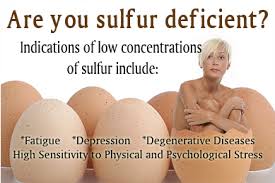Sulfur deficiency and chronic health complications
Sulfur deficiency and chronic health complications: The worrying trend of obesity

Sulfur Deficiency and Chronic Health complications. Corrective measures can be sought from healthy food stuff
Obesity is quickly becoming the number one health issue confronting most people across U.S. and has also risen to epidemic proportions worldwide. The rapid spread of obesity is closely linked to the embracement of western diet. has been associated with the adoption of a Western-style diet. It is no wonder that the widespread consumption of food imports produced by most of the U.S. companies contributes significantly to the increase of obesity globally. The foods we are referring to are often called fast foods and they may include comprehensively processed derivatives of corn, soybeans, and grains, grown on highly efficient mega-farms. Besides one of the core underlying causes of obesity may be sulfur deficiency and that is why we want to interrogate this topic of sulfur deficiency and chronic health complications.
Sulfur is the eighth most common element by mass in the human body after oxygen, carbon, hydrogen, nitrogen, calcium, phosphorus, and potassium. The two sulfur containing amino acids, methionine and cysteine, play essential physiological roles throughout the body. However, sulfur has been consistently overlooked in addressing the issues of nutritional deficiencies. In fact, the American Food and Drug Administration have not even assigned a minimum daily requirement (MDR) for sulfur. One consequence of sulfur’s limbo nutritional status is that it is omitted from the long list of supplements that are commonly artificially added to popular foods like cereal.
Sulfur Deficiency and Chronic Health complications: Ideal sources of Sulfur
Sulfur is found in a large number of foods, and, as a consequence, it is assumed that almost any diet would meet the minimum daily requirements. Excellent sources are eggs, onions, garlic, and leafy dark green vegetables like kale and broccoli. Meats, nuts, and seafood also contain sulfur. Methionine, an essential amino acid, in that we are unable to synthesize it ourselves, is found mainly in egg whites and fish. A diet high in grains like bread and cereal is likely to be deficient in sulfur. Increasingly, whole foods such as corn and soybeans are disassembled into component parts with chemical names, and then reassembled into heavily processed foods. Sulfur is lost along the way, and there is a lack of awareness that this matters.
Experts have recently become aware that sulfur depletion in the soil creates a serious deficiency for plants brought about in part by improved efficiency in farming and in part, ironically, by successful attempts to clean up air pollution. Over the last two decades, the U.S. farming industry has steadily consolidated into highly technologized mega farms. The high yield per acre associated with these farms results in greater depletion of sulfur each year by the tall, densely planted crops. Plants require sulfur in the form of the sulfate radical (SO4-2). Bacteria in well aerated soil, similar to nitrogen fixing bacteria, can convert elemental sulfur into sulfate through an oxidation process. Coal contains a significant amount of sulfur, and factories that burn coal for energy release sulfur dioxide into the air. Over time, sun exposure converts the sulfur dioxide to sulfate, a significant contributor to acid rain. Acid rain is a serious pollutant, in that hydrogen sulfate, a potent acid, penetrates lakes, making them too acidic for life forms to thrive. As for Americans the Clean Air Act, enacted by congress in 1980, has led to substantial decreases in the amount of acid rain released into the atmosphere. Factories have introduced highly effective scrubbing technologies to comply with the law, and, as a consequence, fewer sulfates make its way back into the soil.
Modern farmers apply highly concentrated fertilizer to their soil, but this fertilizer is typically enriched in phosphates and often contains no sulfur. Excess phosphates interfere with sulfur absorption. In the past, organic matter and plant residues remained after the fruit and grain were harvested. Such accumulating organic matter used to be a major source of recyclable sulfur. However, many modern machinery-based methods remove a great deal more of the organic matter in addition to the edible portions of the plant. So the sulfur in the decaying organic matter is also lost.
Sulfur Deficiency and Chronic Health complications: The simple sources of Sulfur
It is estimated that humans obtain about 10% of their sulfur supply from drinking water. Remarkably, people who drink soft water have an increased risk to heart disease compared to people who drink hard water. Many possible reasons have been suggested for why this might be true (Proposed theories for soft water/hard water differences in heart disease), and just about every trace metal has been considered as a possibility. However, I believe that the real reason may simply be that hard water is more likely to contain sulfur. The sulfate ion is the most useful form of sulfur for humans to ingest. Water softeners provide a convenient environment for sulfur-reducing bacteria, which convert sulfate (SO4-2) into sulfide (S-2), emitting hydrogen sulfide gas.
Hydrogen sulfide gas is a poison that has been known to cause nausea, illness and in extreme cases, death may occur. When the bacteria are thriving, the gas will diffuse into the air and give off a foul odor. Obviously, it is rare that the concentration is sufficiently high to cause severe problems. But the sulfate ion is lost through the process. Water that is naturally soft, such as water collected from rain run-off, also contains little or no sulfur, because it has gone through an evaporation-condensation cycle, which leaves behind all the heavier molecules including sulfur.
Sulfur Deficiency and Chronic Health complications: The worrying trend of Obesity


